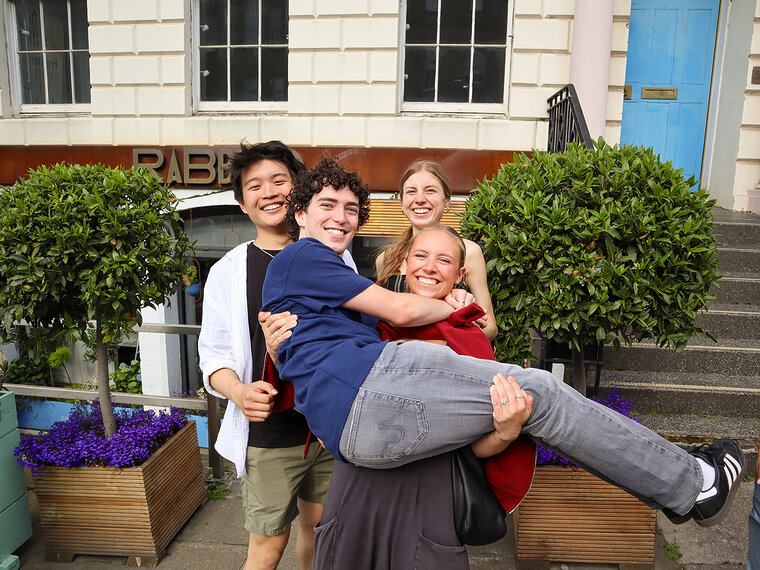Support from DIS
Regardless of the circumstances surrounding the incident of sexual violence or the individuals involved, DIS will support you in your recovery.
The DIS Care Team is trained to support you following an incident abroad, including sexual violence. We can help you consider your options and make referrals to experts as necessary. We will never require that you report to police, have a physical exam, or go home early. However, we will support you in doing any of these things, if you wish.
If an accused perpetrator of sexual violence is a member of the DIS community, DIS can impose sanctions for violations of the Code of Student Responsibility or related policies for faculty, staff, or hosts. Regardless of the identity of the accused perpetrator, you will have access to the support of the Care Team. However, our ability to adjudicate a complaint may be limited by the level of control it has over the learning environment and the accused perpetrator. For more information, contact the DIS Director of Health and Safety.
Navigate medical support with the Care Team
Medical attention is available for physical, emotional, and sexual health needs. The DIS Care Team can make referrals to a counselor and additional medical resources. We can also help a student navigate healthcare system and DIS insurance. If you would like a Care Team member to accompany you to a medical appointment, please ask.
Non-confidential resources
DIS staff (including the Care Team) and faculty are all private but not confidential resources.
This means that:
- Any disclosure of sexual violence (or any other incident) will be treated as private information
- Only those who need to know about the incident and are in a position to provide support will be informed. This will include someone at the student’s home university/college, who will provide information regarding on campus support options.
- No staff or faculty at DIS is a confidential resource. This means that nobody at DIS can guarantee to keep a disclosure of sexual violence secret. However, DIS will respect the student right to privacy.
Emergency contact information for onsite students
If you need to contact the local authorities in Stockholm or Copenhagen:
- Call 112
If you need to contact the DIS Copenhagen emergency phone:
- Call (+45) 3067 1000
If you need to contact DIS Stockholm emergency phone:
- Call 072-1412862 (if calling from a Swedish number)
- Call +4672-1412862 (if calling from an international number)
DIS staff in both locations monitor a 24-hour emergency line service for all current DIS students. These line is provided for your health and safety after normal business hours. These are not call centers, but they will connect you to a local DIS staff member who will be able to assist you during an emergency.
How we communicate with your with emergency contacts
DIS will not contact your listed emergency contacts (obtained during Student Registration) without your express permission — unless the circumstances fall under our listed exceptions below. Please note that these circumstances rarely apply in cases of sexual assault.
Assessing safety and reporting to police
If your immediate safety is being threatened, please call the police at 112.
For non-emergency police contact information:
- Stockholm: call 114 14 or visit a police station
- Copenhagen: call 114 or visit a police station
DIS encourages individuals to report incidents of sexual violence to the local police. Timely reporting to the police is an important factor in successful investigation and prosecution of sexual violence crimes, and may lead to the arrest of an offender or aid in the investigation of other prior incidents. DIS can assist students in reporting sexual violence to the local police but will not require that a student do so.
You can also contact the DIS Care Team to discuss your options. We can accompany you to the police station or help set up a meeting with a Consular Service Officer.
You can also inform the U.S. Department of State that you’ve experienced a crime while abroad. Non-U.S. citizens may find similar supports from their local embassy or consulate.
Learn more about how the U.S. Department of State can help.
Confidential support options
Many people who have experienced sexual assault find support in confidential resources. We’ve gathered lists of confidential support options in Copenhagen and Stockholm, as well as international resources.
More non-confidential support options
Your home campus
Visit your campus website for information on confidential resources on your campus. Title IX, a U.S. federal law, requires that U.S. campuses identify both confidential and non-confidential support options for students. Among those who might be confidential (check with your own campus as confidential resources vary) are clergy, counselors, women’s center staff, and/or crisis center staff.



